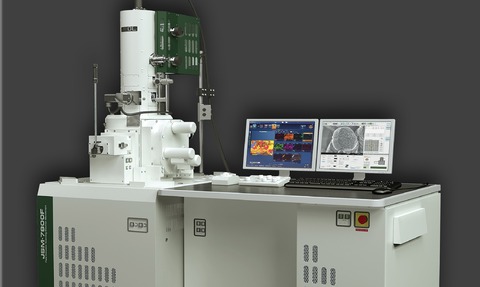
High performance FE-SEM optimised for sub-nm resolution imaging of any type of sample
JEOL’s new series of field emission scanning electron microscopes is now complete with the introduction of the sub-nanometer imaging resolution JSM-7800F.
The JSM-7800F represents a significant leap forward in Field Emission SEM technology, with unmatched resolution and stability for nanotechnology imaging and analysis.
JEOL’s highest performance FE-SEM makes it possible to observe the finest structural morphology of nanomaterials at 1,000,000X magnification with sub-1nm resolutionperform low kV imaging and analysis of highly magnetic samples.
It can also collect large area EBSD maps at low magnifications without distortion and image thin, electron transparent samples with sub 0.8 nm resolution using an optional retractable STEM detector.
The JSM-7800F uniquely combines an in-lens field emission gun with an aperture angle control lens (ACL), optimising large probe currents (up to 200 nA) for operation at the smallest probe diameter.
The new super hybrid lens design and versatile in-column detectors with filtering capabilities allow observation of any specimen, especially at ultra-low accelerating voltages down to 10V.
The SEM excels at low accelerating voltage X-ray spectroscopy and cathodoluminescence, combining large beam currents with a small interaction volume and dramatically increasing analytical resolution to the sub 100nm scale.
Beam deceleration in GB Mode decreases charging on nonconductive samples and reduces lens aberration effects for extreme high resolution imaging.
The JSM-7800F is suitable for a wide variety of applications, from cryo-microscopy to electron beam lithography, and can be configured for low vacuum operation.
It accommodates multiple analytical attachments, including EDS, WDS, STEM, BSE, CL, EBIC, and an IR camera and stage navigation camera.
The SEM comes with a choice of three stage sizes and three specimen exchange airlock sizes.
It can also be equipped with tensile, heating, and cooling stages for in situ experiments.




